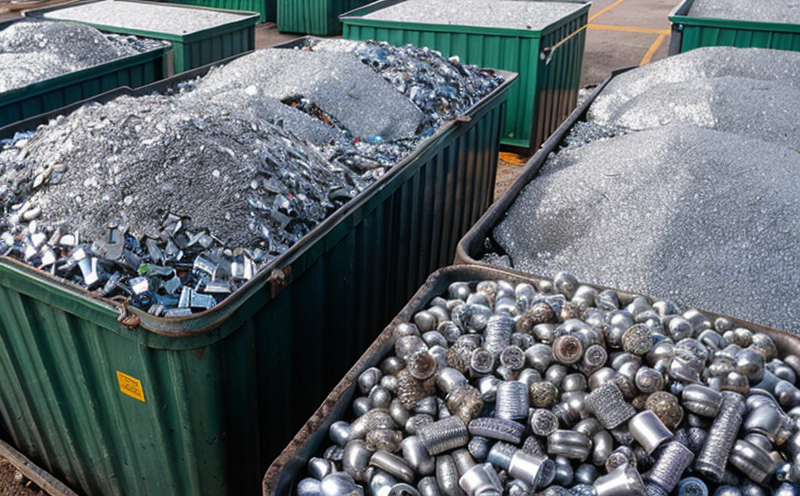ASTM E30 Chemical Analysis of Recycled Metals
The ASTM E30 standard provides a comprehensive framework for the chemical analysis of recycled metals, ensuring that materials meet specified quality standards. This service is critical in waste management and recycling testing, particularly within the metal & alloy recycling sector.
ASTM E30 focuses on the determination of specific chemical elements and compounds present in various types of recycled metals. The standard is widely recognized and accepted across industries to ensure that materials used for manufacturing or other applications are free from harmful contaminants and meet environmental regulations.
The ASTM E30 process involves several key steps, including sample preparation, analysis using precise analytical instruments, and the generation of detailed reports. Sample preparation can vary depending on the type of metal being tested; however, common methods include crushing, grinding, and sieving to ensure a uniform particle size that allows for accurate testing.
The analytical techniques used in ASTM E30 include but are not limited to Inductively Coupled Plasma Optical Emission Spectroscopy (ICP-OES), X-ray Fluorescence (XRF), and Atomic Absorption Spectrophotometry (AAS). These instruments provide high sensitivity, precision, and accuracy necessary for detecting trace elements in recycled metals.
The acceptance criteria defined by ASTM E30 are crucial for ensuring the quality of the recycled metal. The standard specifies limits for various chemical constituents that can impact the performance and safety of final products made from these materials. For instance, certain levels of heavy metals like lead or cadmium must be kept below specified thresholds to comply with both local and international regulations.
ASTM E30 also addresses the issue of impurities in recycled metal streams by providing guidelines for identifying and quantifying unwanted elements that could compromise product integrity. This helps manufacturers maintain consistent quality across batches, which is essential for maintaining customer trust and regulatory compliance.
In practice, ASTM E30 chemical analysis plays a vital role in several areas:
- Environmental Compliance: Ensures that recycled metals meet stringent environmental standards.
- Product Quality Assurance: Guarantees that the final products are free from harmful contaminants and perform as expected.
- Risk Management: Identifies potential risks early in the production process, allowing for corrective actions to be taken promptly.
This service is particularly beneficial for quality managers, compliance officers, R&D engineers, and procurement teams. It supports decision-making processes by providing clear insights into the chemical composition of recycled metals, thereby enhancing operational efficiency and reducing costs associated with non-compliance or substandard materials.
Benefits
The implementation of ASTM E30 chemical analysis offers numerous advantages to businesses operating in the waste management and recycling sector. By adhering to this standard, companies can ensure they are meeting both internal quality control objectives and external regulatory requirements.
- Enhanced Quality Control: Consistent monitoring of recycled metal composition ensures that only high-quality materials enter production processes.
- Risk Mitigation: Early detection of impurities allows for immediate corrective actions, minimizing potential liabilities and associated costs.
- Regulatory Compliance: Adherence to ASTM E30 helps businesses stay compliant with local, national, and international regulations regarding metal content in recycled materials.
- Innovation Support: Accurate chemical analysis supports R&D efforts by providing reliable data on the composition of recycled metals, facilitating innovation in product design.
The benefits extend beyond just compliance; they contribute to sustainable practices and resource efficiency. By reusing and recycling metals, businesses can reduce their carbon footprint while also contributing to broader environmental sustainability goals.
Quality and Reliability Assurance
At the heart of ASTM E30 chemical analysis lies a commitment to delivering accurate and reliable results. Our laboratory employs state-of-the-art equipment and follows strict protocols to ensure every test adheres to the highest standards set forth by ASTM.
The reliability of our testing is further enhanced through rigorous quality control measures, including regular calibration checks for all analytical instruments. This ensures that each measurement is accurate and repeatable, providing consistent results across multiple tests.
Our team of experienced chemists and technicians ensures thorough sample preparation, which is critical in obtaining reliable data. We use advanced techniques such as ICP-OES, XRF, and AAS to analyze samples, ensuring precision and accuracy in determining the chemical composition of recycled metals.
The results generated from ASTM E30 analyses are not just numbers; they represent actionable insights that help clients make informed decisions about their materials. These data points can influence procurement strategies, production processes, and even product development efforts.
Customer Impact and Satisfaction
- Informed Decision-Making: Clients gain valuable insights into the quality of recycled metals they are sourcing or selling. This knowledge empowers them to make smarter choices when it comes to procurement.
- Increased Customer Confidence: Compliance with ASTM E30 enhances reputation and builds trust among customers who value environmental responsibility and product safety.
- Cost Efficiency: Early identification of issues through rigorous testing helps prevent costly rework or scrap, streamlining operations and reducing waste.
- Sustainability Focus: By promoting responsible recycling practices, clients contribute positively to environmental sustainability efforts.
We consistently strive to exceed expectations by delivering accurate results promptly. Our commitment to excellence ensures that our customers receive reliable information about the chemical composition of their recycled metals, supporting informed decisions and fostering long-term partnerships.





